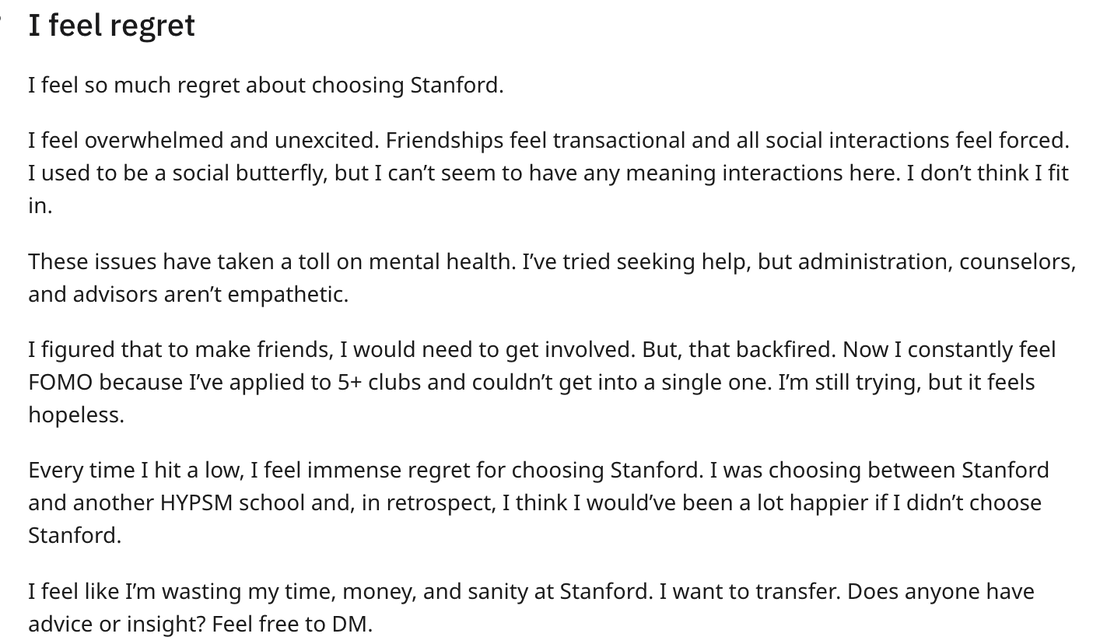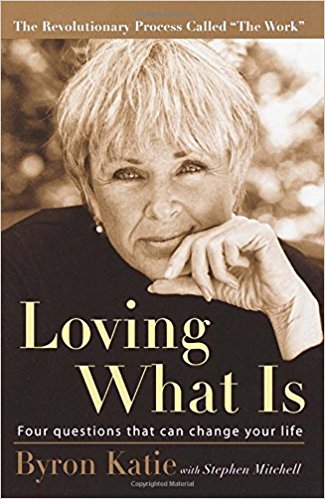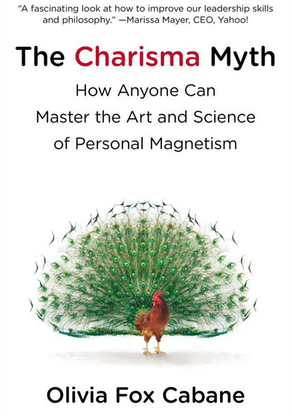You don't "not fit in." You're just being socially weird because you THINK you don't fit in.1/3/2024 I saw a post on Reddit today, in which a freshman wrote that she (he?) regrets her choice to go to Stanford. After reading the details, I replied that she doesn't "not fit in." She just thinks she doesn't fit in, so she's acting socially weird, which makes her actually not fit in. If that sounds like it might be you, read on: Here is the original post: I feel so much regret about choosing Stanford. First of all, loneliness and feelings of isolation suck. From an evolutionary perspective, they are designed to hurt -- real, physical pain. It sucks so much and I'm sorry. But, look. Either everyone at Stanford is mean and exclusive, or you are doing something that's preventing real friendships from forming. The sooner you can take accountability and do some reflection on what you're doing wrong, the sooner you'll start making friends. Here are some things that I saw in your post that may or may not be completely accurate, but might give you some starting points for reflection: I feel overwhelmed and unexcited. I had a friend who used to kinda scowl a lot at parties and stuff because she was unexcited. The result? No one talked to her. So she got madder and felt more uncomfortable and less excited. So she looked more miserable. So even fewer people talked to her -- most were scared to even look at her! People don't go out because they want to talk to someone who is scowling and miserable. If you could find a way to cognitively reframe your attitude about Stanford, especially during social events, and could come across as more excited, you'd probably have more and more positive interactions. Here's a thing I wrote about cognitive reframing. Cognitive reframing has long been used in cognitive behavioral therapy (CBT) to help patients with identify -- and then disrupt -- negative thoughts and thought patterns. Originally developed to combat depression, it quickly caught on among psychologists, and soon spread to more general uses. Lachman et al. (1992) found that cognitive reframing improved poor memory. It has also been shown to reduce performance anxiety and help parents and children cope with disabilities. It reduces stress and anxiety... and even increases happiness and wellbeing. And, with a little effort, it can have a powerful affect on your life, too. For example, road rage. For a lot of people, something as fleeting as being cut off by another driver on your way to work could be enough to derail their whole morning, as your stress and fight-or-flight instincts cause adrenaline and cortisol to be pumped into your system. "What a jerk! Doesn't that guy realize what an idiot he is? He's going to kill someone!" you might scream to yourself. Or you may scream at directly at him, even though he can't hear you. You may lean mercilessly on your horn -- or even flip him the bird! Honestly, just imagining such a scenario is enough to make most peoples' blood pressure spike. Here's how to cognitively reframe this situation: Humanize the person who cut you off. Instead of assuming he is a jerk... assume he is in the car with his wife. She's gone into labor, and he is frantically trying to get to the hospital for his son to be born. Of course he cut you off -- can you really blame him? So how does the Stanford girl incorporate this into her life? Next time she's nervous about a party or event or interaction, she can pause and tell herself, "I am SO EXCITED for this event." I cannot WAIT for this conversation!" This is weirdly effective, according to research, because excitement and anxiety are physiologically very similar -- the main difference is attribution. Is my heart racing because I'm scared, or excited? Next time she's feeling overwhelmed, she can cognitively reframe the situation, telling herself, "Stanford has a million opportunities, and I'm taking advantage of as many as I can, and that is SO exciting!" or, "All freshmen feel this way until they get their bearings -- the material is hard, but we are doing it! Together!" Even if you don't completely believe it, a part of you will. And that will impact your brain, which will impact your mood, which will impact your social interactions and overall well being. Friendships feel transactional and all social interactions feel forced. Don't ignore your own agency in friendships and interactions. By definition, interactions involve at least two people. One of them is you. If transactional and forced is how all interactions and friendships feel to you, maybe YOU are the one making it that way. Or maybe you're just imagining it. A lot of people suffer with intrusive thoughts that are not consistent with reality. Maybe the problem isn't what other Stanford students do -- it's your interpretation of it. Such thoughts correlate with depression, but that can be interrupted and reframed. I highly recommend reading Loving What Is: Four Questions That Can Change Your Life, by Byron Katie, whom I first met during her guest lecture at Stanford. Next time you think someone is being interactional, ask yourself: Is it true? Are you SURE? You'll find that it's almost never true and you can hardly ever sure. Find a way to reframe and assume the best in people. Instead of, "She didn't like talking to me -- the interaction felt forced," tell yourself (repeatedly, even if you don't fully believe it), "She was running late for class," or, "He was stressed about his chemistry test." REMEMBER: 99.999% of the time, the latter is more likely to be true. Not every negative emotion people experience is about you. I don’t think I fit in. Everyone takes time to adjust and find their group. Some people THINK they found their group, then sophomore year, all their friends get put in different dorms, and they stop hanging out -- turns out, their friends were of the convenient variety. Who cares, though? They still had fun together for a whole year! Everyone struggles to find their place. Some people find it sooner than others. But when you go into things -- classes, clubs, dining halls -- with the feeling that you don't belong, it will show on your face and body language, which will do two things: 1. It will decrease how many people want to talk to you 2. It will make people who DO talk to you think that you don't like them. This is REALLY important: just as YOU attribute everyone's unspoken negative emotions -- stressed about a test, late for class, homesick -- to yourself, OTHER PEOPLE DO THE SAME THING WHEN THEY TALK TO YOU. If someone is talking to you and you're sitting there feeling overwhelmed and like you don't belong, that person is going to think, "She's unhappy because she doesn't like ME. *I* am the reason she seems unhappy." People attribute what they see on your face and in your body language to themselves. And, since people like people who like them, it's going to make them not like you. A lot of people don't know this, but charisma is a science, not an art. If you want to be charismatic, you need to be present and authentic, and you need to show genuine care and interest in others. Here's a video I made that illustrates this really well. The "guy" on the left -- me -- is eager to please... which is great. Except he is really only thinking about himself and his feelings. He isn't present in the moment. He isn't enjoying what is happening around him. He is so involved in how he is feeling that he isn't picking up on how other people are feeling, which is obviously going to cause interpersonal tension down the line The girl on the left -- also me -- is totally immersed in the moment. She is loving the cocktails, the band, the dance floor, the activity. She is completely in tune with her partner, listening intently while he speaks and not just feeling, but anticipating, the way he is going to move on the dance floor. Granted, this is not real. This is ACTING. But when I was filming the guy part, I really tried to put myself in a self-focused, eager headspace. When I was filming the girl part, I looked into the camera and pretended it was someone I cared about, telling me an interesting story or teaching me a new dance move. I had an actual guy in mind (the one I wrote 9:15 about, in fact), and I was recalling an actual story he told me and responding how I actually would have. It's not PERFECT. But what I think is powerful about this side-by-side is how it's the same person (me), but in the one frame, I seem very cringe to be around, and in the other... I mean, I seem like the kind of person I would want to hang out with. Or maybe I'm just way overestimating my own acting ability. Either way. Charisma is a science. Not an art. Some people automatically learn it. Others need to actively learn it. If you're struggling to connect with others, I highly recommend reading Olivia Fox Cabane's The Charisma Myth: How Anyone Can Master the Art and Science of Personal Magnetism. It will change your life. But, going back to the OP's thing about Stanford. Girl, the first thing you need to do is accept that the problem isn't Stanford. The problem is that your feelings are interfering with your interpersonal stuff. Going to a different school wouldn't change that, except insofar as you might be less in your own head at another school, so you won't act so weird and make everything think you don't like them. The problem isn't that you don't fit in. It's the way you act because you think you don't fit in.
1 Comment
4/14/2024 12:38:55 am
I wanted to express my gratitude for your insightful and engaging article. Your writing is clear and easy to follow, and I appreciated the way you presented your ideas in a thoughtful and organized manner. Your analysis was both thought-provoking and well-researched, and I enjoyed the real-life examples you used to illustrate your points. Your article has provided me with a fresh perspective on the subject matter and has inspired me to think more deeply about this topic.
Reply
Leave a Reply. |
About the Author

Eva is a content specialist with a passion for play, travel... and a little bit of girl power. Read more >
Want to support The Happy Talent? CLICK HERE!
Or Find me on Patreon!
What's Popular on The Happy Talent:
Trending in Dating and Relationships:
What's Popular in Science: Playfulness and Leisure Skills:
Popular in Psychology and Social Skills:
Categories
All
|




























 RSS Feed
RSS Feed